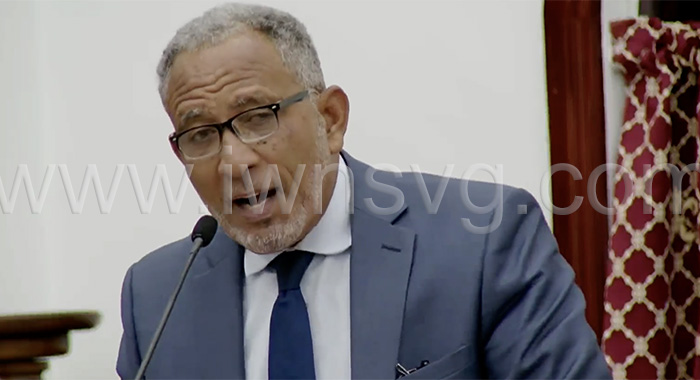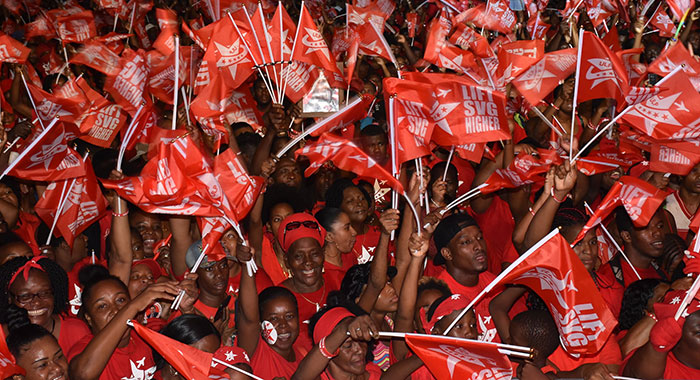Three years ago, the Unity Labour Party (ULP) was promising a possible increase in National Insurance Services (NIS) pensions and other benefits.
However, today the ULP government has announced among NIS reform options, increasing the NIS contribution rate to at least 15% — up from 10%, increasing the pensionable age up to age 67 by 2032, and reducing the maximum old age pension replacement rate from 60% to 55%.
Leader of the Opposition Godwin Friday noted this week that in the leadup to the November 2020 general election, the ULP suggested an increase in NIS benefits after the 11th actuarial review, which was recently tabled in Parliament.
“… in their manifesto leading up to the 2020 elections, this is what they ULP said: they said they will conduct a … and publish before the end of 2020 the 11th actuarial evaluation of the NIS,” the opposition leader said on his party’s radio programme on Monday.
He noted the actuarial review was only tabled in Parliament last Thursday.
“… and here was where they continue, ‘Out of this will likely come increases in pensions and other benefits and recommendations on the way forward,” Friday said, quoting the ULP manifesto.
“So, in the election manifesto 2020, they were saying after the 2020, 11th actuarial evaluation of the NIS that likely will come increases in pensions and other benefits.
“In the Parliament on Thursday, the minister was wringing his hands about all kinds of things that they will have to do. None of them talk about increasing benefits and increasing pensions,” the opposition leader said on “New Times”.
He pointed out to lawmakers that among the options mentioned by Finance Minister Camillo Gonsalves was raising the NIS contribution rate to 15% and increasing the pensionable age to 67.
“What do you do in the period in between retirement and age 67?” Friday said.
Then you have also the possibility of reducing benefits for persons who have invested in the NIS. So, these options don’t square in any way with what they were promising just two and a half years ago, in order to get re-elected or to come back into government,” the opposition leader said.
“They said that the study, the evaluation out of that will likely come increases in pension and other benefits. That is what they said in 2020. So, what happened?” he said, noting that there were warnings from the International Monetary Fund dating back 15 years.
He said that although the law mandates it, the only actuarial review of the NIS that the ULP administration never tabled in Parliament in its 22 years in government was the 2020 review.
“We didn’t get the actual reports before this is the first one that I have seen that was only given to us in Parliament on Thursday.
“But all the others before that, under this administration, we the opposition didn’t get a copy although the law requires it to be placed in Parliament.”

He said the government has not done anything to address the issues that were affecting the NIS.
“… they boast about how many persons are on the NIS and how much they have increased the pay-outs and so forth and how many specific, the programmes have benefited either from a short-term contribution or from other long-term contributions, non-contributory pensions — they set all of that out in their manifesto.
“But what they didn’t say is that the NIS, under their watch, that the foundations upon which it was built was crumbling, and that everybody’s pension would then be placed in jeopardy unless, as they say, draconian measures are taken.”
Friday said:
“You have to put the blame squarely on the maladministration, the mismanagement of the finances of this country and the financial institutions upon which citizens depend, the NIS being one of them. This is something that they should’ve been dealt with much sooner.”
The opposition leader said the government’s handling of the NIS “is consistent with the way in which this government has governed over the past number of years in the cavalier way in which they have treated the financial guardrails that you’ve heard me talk about in various statements in the Parliament that are there in the Constitution, that are there in the Financial Administration Act; that are there in the Audit Act.”
He said that when former Opposition Leader Arnim Eustace warned the government about its handling of the NIS, they said that he was “too timid”.
The opposition leader said the government has also been reckless in its use of special warrants and flouted the law in doing so, as was the case with the overdraft at the Bank of St. Vincent and the Grenadines.
Friday said there were inconsistencies between what the bank and the government said the overdraft was.
“…one time I said $95 million, essentially in the overdraft they can’t account for. That amount now has gone up because every year since then the gap continues. And it’s now over $112 million … and they have not explained that,” Friday said, adding that this is “another cavalier way” in which the government has mismanaged the nation’s finances.
“They have added to the national debt by essentially exceeding the amount that they can use, they can borrow on overdraft and then when they can’t bring it back down, as is required by law, it just essentially hive it off and forms part of the permanent debt of the country,” Friday said.
“These are the things that we have complained about and saying that it’s reckless, the way in which this government has managed the finances of the country and it has not changed. And it has led now to a situation where we are in serious jeopardy.
“How did we get here when it comes to the NIS? How did we get here? And the government has to take responsibility for that.”
He said one of the most important and lasting ways in which to help to revive the NIS is to increase the flow of contributions into the NIS from younger workers.
“And that comes from a growing economy so that you have greater employment. And that you have persons here who are doing those jobs, who can then contribute to the National Insurance Service and you build the base up so that the younger persons help to carry those persons in retirement and if that pool is growing that helps to sustain it.
“But we have a country where the economy is faltering under this present administration, growth rate of under one under 2%. For the last 22 years on average — annual average. How can you have workers growing as a pool and contributing to the sustainability of the NIS going forward? It is a very, very important and solemn matter.”






